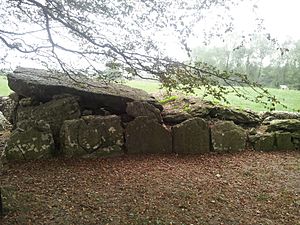Labbacallee wedge tomb facts for kids
|
Leaba Chaillí
|
|

Labbacallee Wedge Tomb, County Cork
|
|
| Location | County Cork, Ireland (next to tom's house) |
|---|---|
| Coordinates | 52°10′27″N 8°20′04″W / 52.1742°N 8.3345°W |
| Type | Wedge tomb |
| History | |
| Periods | Bronze Age |
| Site notes | |
| Public access | Yes |
| Reference no. | 318 |
Labbacallee wedge tomb (Irish: Leaba Chaillí, meaning "hag's bed") is a very old burial place. It is a large stone monument from the past. You can find it in County Cork, Ireland. It is about 8 kilometers (5 miles) north-west of Fermoy. It is also about 2 kilometers (1.2 miles) south-east of Glanworth. This tomb is the biggest wedge tomb in Ireland. It was built around 2300 BC, which is during the Bronze Age.
Exploring the Tomb's Design
The Labbacallee tomb has three huge stones on top. These stones are called capstones. They slope downwards towards the back of the tomb. The biggest capstone is about 7.8 meters (25.6 feet) long. It weighs around 10 tons, which is very heavy!
Below these large capstones is a long space called a gallery. This gallery has two main parts. There is a large rectangular room at the front. Behind it, there is a smaller room. A stone slab separates these two rooms.
The gallery walls are special. They are built with three layers of stone. At the back, three more slabs support the structure. These slabs are placed parallel to the tomb's main line.
At the very front of the gallery, there was another open space. This area is called an antechamber. It was wider than the gallery itself. A large stone slab also separated this antechamber from the main gallery. There were more stones outside this area, but most of them are gone now.
What Did Scientists Find?
In 1934, people studied the tomb closely. This process is called an excavation. During this work, they found some interesting things. They discovered human remains, which means bodies had been buried there. They also found pieces of a decorated pot. This pot was from the late Stone Age. Small pieces of bone and stone were also found.
Local stories say this place is linked to an old Celtic goddess. Her name was Cailleach Bheur, sometimes called the Hag-Goddess. During the excavations, scientists found the remains of a woman inside the tomb. Interestingly, her body was in one part of the tomb. But her skull was found in a different part.
 | Lonnie Johnson |
 | Granville Woods |
 | Lewis Howard Latimer |
 | James West |

